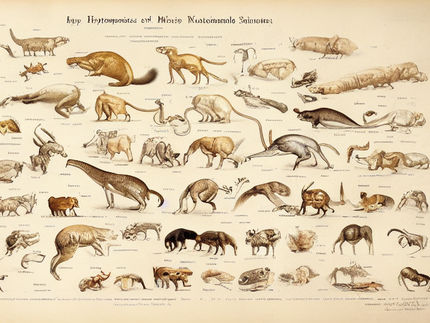Revolutionary Pan-Genome Analysis of Lactic Acid Bacteria Unveils Promising Opportunities for Food Industry and Healthcare
A team of international researchers has published the first comprehensive comparative pan-genome analysis of lactic acid bacteria (LAB), a family of microorganisms essential to natural ecosystems and the food industry. The study was carried out by scientists from the Novo Nordisk Foundation Center for Biosustainability (DTU Biosustain) and the University of California, San Diego.

symbolic picture
computer generated picture
Mapping the Genetic Landscape of Lactic Acid Bacteria
The new study represents a crucial leap in understanding the genetic capabilities of 26 LAB species, in the first of it’s kind family-wide pangenome analysis. By analyzing over 2400 publicly available genomes of high quality, the researchers successfully mapped the functional genetic capabilities, metabolic pathways, and biosynthetic gene clusters of individual strains across 26 species in the Lactobacillaceae family. Researchers developed a novel integrated workflow for large-scale pangenome analysis that includes important steps of data curation, taxonomic definitions, phylogroup identification, pangenome reconstruction, functional annotations and genome mining. This advanced computational analysis resulted in better understanding of functional differences across different LAB species as compared to prior efforts focused on individual species or metagenome studies.
"In mapping the genetic landscape of LAB, we have cracked open the door to a treasure trove of novel possibilities represented by phylogenetic groups and individual strains for future biotechnological applications," says Postdoc Omkar Satyavan Mohite from DTU Biosustain who is one of the lead authors of the study.
Can drive advancement in the food industry and healthcare
The outcomes of this groundbreaking research are not confined to data science investigation of microbes; they have real-world applications. "We've laid the groundwork for everything from species identification and functional studies to phylogenetic research and biotechnological innovations. This work can drive advancements in various sectors, including the food industry, healthcare, and environmental sciences," says Akanksha Rajput, a Postdoctoral Researcher at UCSD and also one of the lead authors of the study.
This research is especially relevant for experts and investigators across academic, industrial, medical, and environmental domains, all of whom can utilize these data driven insights to prioritizing strains of required genetic background.
According to the researchers, future work will use pan-genomic characteristics as a key tool for delving deeper into bacterial evolution, metabolic pathways, or sequence level variation. The integrated pangenome analysis workflow harvested here could be crucial platform to further investigate other microbial groups of industrial relevance.
The corresponding author of the study is Professor Bernhard O. Palsson. The study was led by Akanksha Rajput (Postdoctoral Researcher at UCSD), Siddarth Chauhan (Ph.D. student at UCSD), and Omkar S. Mohite (Postdoctoral Researcher at DTU Biosustain). Collaboration included teams from DTU Biosustain's Microbial Foods, the Reconstruction Team, and Genome Analytics.
Most read news
Topics
Organizations
Other news from the department science

Get the analytics and lab tech industry in your inbox
By submitting this form you agree that LUMITOS AG will send you the newsletter(s) selected above by email. Your data will not be passed on to third parties. Your data will be stored and processed in accordance with our data protection regulations. LUMITOS may contact you by email for the purpose of advertising or market and opinion surveys. You can revoke your consent at any time without giving reasons to LUMITOS AG, Ernst-Augustin-Str. 2, 12489 Berlin, Germany or by e-mail at revoke@lumitos.com with effect for the future. In addition, each email contains a link to unsubscribe from the corresponding newsletter.





















































